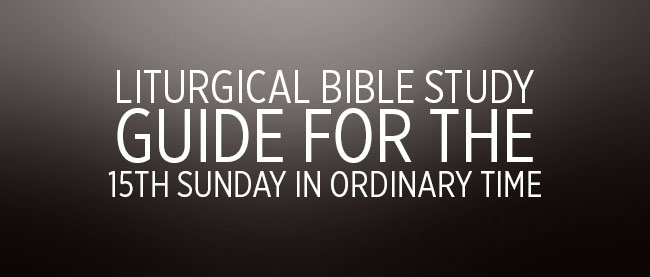1st Reading – Deuteronomy 30:10-14
The title “Deuteronomy” comes from the Septuagint deuteronomion (meaning “second law”). Moses is addressing a new generation of Israelites, all those who would have been under the age of twenty when the exodus began almost 40 years earlier. These “new” Israelites are gathered in Moab to hear Moses restate the Law to them. This was necessary because their parents had committed apostasy in making the golden calf and by worshiping Baal-Peor by which they had thereby defiled themselves. The covenant of Deuteronomy is different from the Sinai covenant. Deuteronomy itself in 29:1 makes this clear: “These are the words of the covenant which the Lord commanded Moses to make with the people of Israel in the land of Moab, besides the covenant he made with them at Horeb (Sinai).”
After the golden calf, Israel deserved to die. Instead, they were placed on probation, under the strict legal supervision of the Levites, with Moses as the court-appointed guardian and probation officer. After many probationary violations, Israel was re-sentenced to forty years of detention and hard labor in the desert. At the release date, a parole hearing was held on the plains of Moab, where it was determined that Israel was not truly rehabilitated.
In Deuteronomy God retained many of the original terms of Israel’s initial probation. They had to remain under Levitical supervision, while Joshua replaced Moses as Israel’s guardian. However, the Judge realized the need to add three new sets of conditions for living at home: legal concessions, ritual stipulations and redemptive curses.
The legal concessions are permission of such things as divorce and remarriage, foreign slave-wives, and genocidal warfare against Canaanites; these are a downward adjustment on God’s part to a more realistic level of expectations for a sinful Israel. At the same time however, priests and Levites had to follow a much stricter marital morality: they were not permitted to marry non-virgins or divorcees, nor presumably was divorce and remarriage allowed.
The ritual stipulations require the sacrificial offering of firstborn from the herds and flocks at a central sanctuary. These laws may be seen as a counterbalance to the first, since the second set serve to remind Israel of its call to holiness, through to a lesser degree than the Levites.
The third set of conditions, the redemptive curses, comes at the time of our reading today. Moses solemnly declares with certitude that all the curses of the covenant will inevitably befall Israel at some point in the distant future. Previously, he had placed Israel under the curses conditionally, in a formal oath-swearing ceremony but now he says “… when all these things come upon you, the blessing and the curse…”
Our reading today comes from this final discourse of Moses, just prior to the selection of Joshua to lead the people into the promised land. It is the conclusion of the covenant making ceremony.
2nd Reading – Colossians 1:15-20
This week we begin a four week tour through the Letter to the Colossians as our epistle reading.
Although imprisoned in Rome (A.D. 61-63) when he wrote this letter, Saint Paul enjoyed relative freedom in what he was allowed to do. Colossae was a city in Phyrgia, about 125 miles east of Ephesus, and very close to Laodicea (now a part of Turkey). The church at Colossae was composed mostly of Christians of gentile background and had not been founded by Saint Paul himself, but by a disciple of his, Epaphras (Colossians 1:7). Paul was, however, well informed about how the church was faring. In fact, it was a visit to Rome by Epaphras that occasioned this letter because Epaphras reported to the apostle about dangerous doctrines which had recently made their way into the church, threatening both faith and morals. False teachers were introducing a series of outdated Mosaic practices – such as observance of the law of the Sabbath, identification of certain foods as unclean, and an exaggerated emphasis on the role of angels as intermediaries between God and men, which threatened to undermine the true doctrine of Christ as the only mediator.
Saint Paul uses the occasion to instruct the Colossians and to restate for them the truth about the absolute supremacy of Jesus Christ, as beginning and end of all creation. He is the true creator, conserver and redeemer, for He is the Son of God.
Gospel – Luke 10:25-37
Last week in our study of the Gospel, we heard of the mission of the seventy-two as they went out as sort of an advance party to the towns Jesus intended to visit. When the seventy-two returned, they were jubilant about what they had been able to do in His name. Jesus then cautioned them not to rejoice in what they had done, but in the fact that their real reward would be in heaven. Today we hear the parable of the good Samaritan. This passage is two-pronged. While providing a powerful lesson about mercy toward those in need, it also proclaims that non-Jews can observe the Law and thus enter into eternal life.


